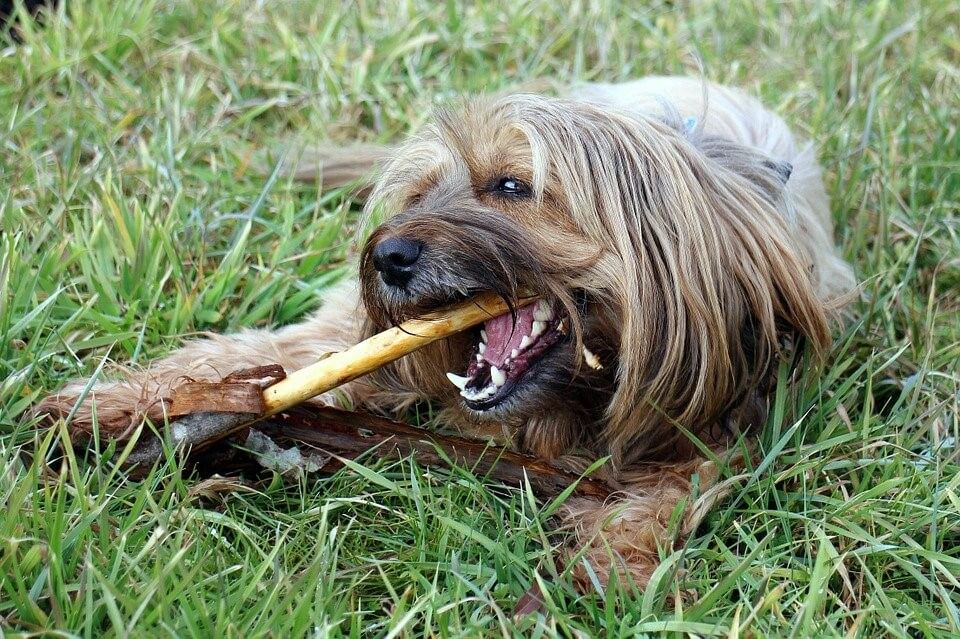The Ultimate Guide to Dental Care for Dogs
As a dog owner, you will have experienced the unpleasantry of bad breath. This is usually a surefire signal that your dog's dental health needs to be addressed, which more times than not involves a combination of a good diet and a brushing routine.
It's important to address dental concerns as a priority because these can lead to serious health concerns when not addressed vigilantly. Maintaining your dog's dental hygiene should be high on your priorities, alongside implementing food options that contribute to healthy dog teeth.
So how exactly should you go about keeping your dog's mouth clean? Let's address some favorable dental practices:
Visit Your Veterinarian – Dental Cleaning
Dental care will often begin at your veterinarian's office. Here your beloved pet can be evaluated by a medical professional, who will have the experience to spot dental tartar and disease. If your dog is suffering from oral disease, your vet might recommend pulling out one or more teeth to prevent additional health complications.
With regular checkups, you can safeguard your dog from harm. With regular examinations, your doctor will lookout for things like yellow-brown tartar, reddened gums and other signs of disease. Dental X-rays can highlight issues below the gum line, where a full dental exam is worthwhile if it reveals things about your pet's dental health.
If dental disease is apparent, your vet is likely to recommend a deep clean. This will involve cleaning the teeth with a scaler while addressing areas where the gums are detached from the teeth. Dental cleans are performed under general anesthetic because let's face it holding a dog down for too long is a near impossibility.
If you're concerned about anesthesia, you needn't be. The benefits of maintaining good dental hygiene far outweigh the risks that come with a general anesthetic. It's important to establish a dental cleaning routine that works best for your pet, whether that's once a year or every six months.
Brush Your Pet's Teeth Daily
At-home care is the most important consideration. After all, it's your responsibility as a pet owner to maintain your dog's dental hygiene, as someone who's there for them every day. By establishing a good oral hygiene routine by brushing your pet's teeth daily, you'll reduce the likelihood of further health complications.
Brushing every few days or once a week simply isn't enough. Bacteria can accumulate which can cause dental disease within a matter of days. Though daily brushing will seem challenging at first, it's actually much more feasible than you first realize. You can begin with basic tools like pet toothpaste and a soft-bristled toothbrush and perhaps work your way up from there.
It helps to use toothpaste which your dog enjoys the taste of, at which point brushing will be less of a chore and actually embraced. Work the brush in a circular motion, spending around 30 seconds on each side of the mouth. Be patient, start off slowly and gradually work your way up to longer brushing sessions.
Focus on Implementing the Right Diet
There are some specialist diets which will ensure great hygiene. These diets are usually good for an all-encompassing range of health benefits, not exclusive to dental ones. Some research suggests commercial diets are beneficial, particularly in comparison with regular dry food.
Dental foods use specialized kibble for better mechanical cleaning. You should always get the approval of your dentist before initiating a specialist diet. The likelihood is your vet can offer critical insight and advice to help you establish the best dental care regime possible.

Offer Your Dog Chew Treats
Many of today's chew treats are designed to keep your pet's teeth clean. Products with the Veterinary Oral Health Council (VOHC) seal of approval are great for controlling tartar and plaque in dogs. It helps to know which treats to avoid too, like real bones, pig's ears, cow hooves, etc.
839GYLCCC1992


 (2 votes, average: 4.50 out of 5)
(2 votes, average: 4.50 out of 5)
Leave a Reply